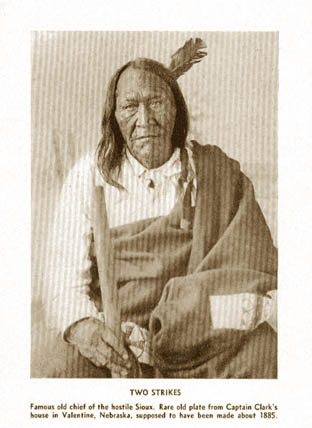Chapter 7 - SITTING BULL
As the famed Sitting
Bull was his uncle, the chief wished to talk about him, and told of the
suffering that followed the removal of the Minnesota bands to Crow
Creek in 1863. There the young man learned of the terrible injustices
and frightful sufferings that his people were subjected to at the hands
of the national government through its grafting agents and hordes of
unconcionable [sic] politicians. The outrageous treatment of these
innocent and confiding natives, whose rich land along the Mississippi
was confiscated by the land-speculators—and then "purchased" by treaty,
but never paid for, as usual, and the owners thrust far out into the
barren sandhills and allowed to starve and die of helplessness and foul
disease—left an indelible hate in the heart of Sitting Bull against the
white race. Sitting Bull was a natural leader, but it was after the
ruthless breaking by the whites of the treaty of 1868, that he gained
wide prominence; he visited Washington with Red Cloud and Spotted Tail,
where they were entertained by President Grant. At a council on Powder
River he made a speech to his associates which indicates the range of
his oratory and intellect. He said: "Behold, my brothers, the Spring
has come; the earth has received the embraces of the sun and we shall
soon see the results of that love! "Every seed is awakened; and so has
all animal life. It is through this mysterious power that we too have
our being, and we therefore yield to our neighbors, even to our animal
neighbors, the same right as ourselves, to inhabit this land. "Yet hear
me, people, we have now to deal with another race—small and feeble when
our fathers first met them, but now great and overbearing. Strangely
enough, they have a mind to till the soil, and the love of possession
is a disease with them. These people have made many rules that the rich
may break, but the poor may not; they have a religion in which the poor
worship, but the rich will not. They take tithes from the poor and weak
to support the rich and those who rule. They claim this mother of ours,
the earth, for their own and fence their neighbors away; they deface
her with their buildings and their refuse. That nation is like a spring
freshet that over-runs its banks and destroys all who are in its path.
"We cannot dwell side by side. Only seven years ago we made a treaty by
which we were assured that the buffalo country should be left to us
forever. Now they threaten to take that from us. My brothers, shall we
submit, or shall we say to them: 'First kill me before you take
possession of my fatherland.'" Observing a photograph of Sitting Bull
which hung on the wall, the old chief remarked that he was the brains
of the fighting forces, but the fighting was led by Crazy Horse, his
young war-chief. This was after Red Cloud had agreed to peace and
retired from active leadership. He said that Sitting Bull was always a
fair fighter and never killed any women or children. Noticing the old
ceremonial peace-pipe in the cabinet, which he had presented to the
writer after holding it as head chief for half a century, the chief
told how it had been turned over to him by Sitting Bull when he left to
lead his so-called hostiles to Canada, after the Custer battle. He said
most of the great treaties had been made over its smoke, and that it
was more than a hundred years old, and probably much older.
|



